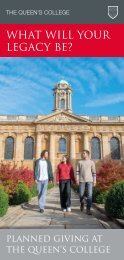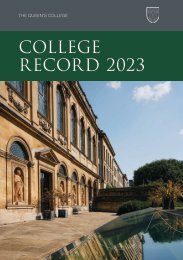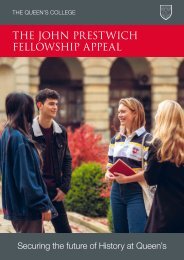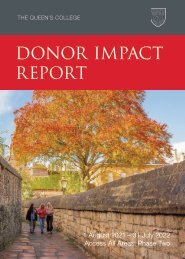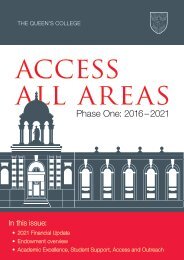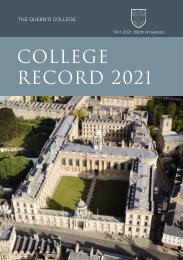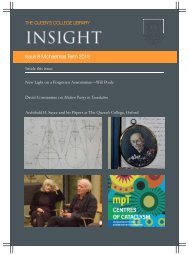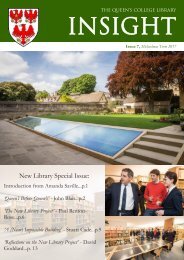The College Record 2022
You also want an ePaper? Increase the reach of your titles
YUMPU automatically turns print PDFs into web optimized ePapers that Google loves.
Reports and <strong>College</strong> Activities<br />
Credit: John Cairns<br />
FROM THE BURSAR<br />
Dr Andrew Timms<br />
Bursar<br />
<strong>The</strong> past year has been marked by a sense of returning<br />
normality and it has been very pleasing to see the <strong>College</strong><br />
come back to life. That is not to imply that it has been plain<br />
sailing, however: life has become very much more difficult<br />
on financial and operational fronts. We have struggled, like<br />
many other employers, to recruit and retain waiting staff<br />
and cleaners (scouts), which has made it quite difficult to<br />
resume the customary level of operations at precisely the<br />
moment when it was most desirable to do so; and as<br />
inflation has taken hold we have also experienced a certain<br />
amount of understandable tension in what is normally a<br />
very tranquil and happy workforce. <strong>The</strong> <strong>College</strong> has responded to this in a number<br />
of ways. Firstly, we have kept a close eye on remuneration: we reviewed pay several<br />
times, and brought forward a significant portion of our normal August pay rise for<br />
all staff; we also increased the salaries of the lowest paid staff so that they now<br />
receive the so-called Oxford Living Wage – this is a multiple of the Living Wage<br />
Foundation’s ‘real’ Living Wage (with which we have been an accredited employer<br />
for several years). And we also paid all staff bonuses in respect of the exceptional<br />
efforts made to keep the <strong>College</strong> functioning during the pandemic. Secondly, we<br />
have embarked upon a consultation on employment terms and conditions with all<br />
non-academic employees, which will look to replace the current patchwork quilt of<br />
varying contractual arrangements that have accumulated over time with a modernised<br />
employment contract, offering more holiday, flexibility, and better benefits in return<br />
for the harmonisation of working hours and other practices across the <strong>College</strong>.<br />
So in some ways the past year has been more demanding than the pandemic<br />
itself. This has certainly been true of the <strong>College</strong>’s finances. For example, the<br />
budgeting process had to be interrupted twice to take account of changing inflation<br />
expectations, and the general level of pressure on financial decisions has increased<br />
markedly. Energy costs are a particular concern: they are expected to more than<br />
double if we compare this year (<strong>2022</strong>–23) with last year (2021–22), and forecasts<br />
for next year suggest further significant increases. To put this into context, in more<br />
normal times the <strong>College</strong> would have expected to be spending a little under £500k<br />
on energy in a year; the budget this year is over £900k and forecasts for next year<br />
have varied wildly, at times reaching numbers well in excess of £1.5 million. This is a<br />
significant fraction of our core unrestricted educational and operational expenditure<br />
(which is around £10 million per annum). A notable constraint is that, realistically,<br />
we cannot expect simply to pass these costs on to students, so the <strong>College</strong> ends<br />
up increasing its subsidisation of accommodation. We can absorb this for a year or<br />
two, but if higher energy costs persist then we will have to reconsider our charges<br />
more fundamentally.<br />
34 <strong>The</strong> Queen’s <strong>College</strong> | <strong>College</strong> <strong>Record</strong> <strong>2022</strong>






